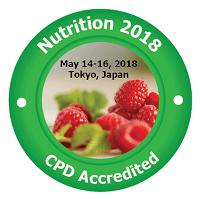
Iman Mirmazloum
Researcher in Kaposvár University, Hungary
Title: Enzymatic Degradation of Sodium alginate, Chitosane and Pectin resulted in oligosaccharides with boosted prebiotic index
Biography
Biography: Iman Mirmazloum
Abstract
Scope of the research: Prebiotics are getting more and more into the forefront of interest of researchers and suppliers, as these non-digestible polysaccharides are of justified health promoting impact due to the facilitation of the growth of certain beneficial, health-associated gut bacteria. Their positive physiological effects might efficiently be utilized by several segments of the food industry. Sodium alginate, chitosane and pectin are commonly used polysaccharide molecules in relevant food industrial application. The scope of this research was to increase their biological value by enzymatic digestion and enhancing their prebiotic activity.
Methodology & Theoretical Orientation: Sodium alginate, chitosan and pectin have been subjected for enzymatic degradation by Pectinase, Lactase, β-Galactosidase, Glucosidase and two commercial blended enzymes mixture to produce their corresponding oligosaccharides with plausible prebiotic effect. The enzymes have been studied for their optimum reaction condition (pH and temperature) and consequently their potential activity on breaking the tow polymers. The reaction products were then subjected for both analytical and microbiological assays, in order to establish the quality, quantity, and the prebiotic effect of degradates, respectively. The Prebiotic index of the obtained oligosaccharides has been assessed using Lactobacillus delbrueckii subsp. Bulgaricus, and Lactobacillus casei 2756. Casei, as bacterial representatives.
Findings: Thin layer chromatography revealed the enzymatic degradation pattern of the studied macromolecules. The results showed an enzyme quantity oriented reaction rather than time or substrate concentration oriented interaction. Almost the same amount of hydrolysates has been released from 0.1 and 1% pectin solutions as a result of the enzymatic hydrolysis from the carbohydrate polimers. The highest prebiotic indices have been established for the pectin degradates yielded by pectinase, and the alginate oligosaccharides after 24h co-culture with glucosidase enzyme. Pectin and chitosane degradates also enhance significantly the bacterial culture. It can be concluded that the hydrolysed polysaccharides can be applied as prebiotic elements to be supplemented in functional foods.

